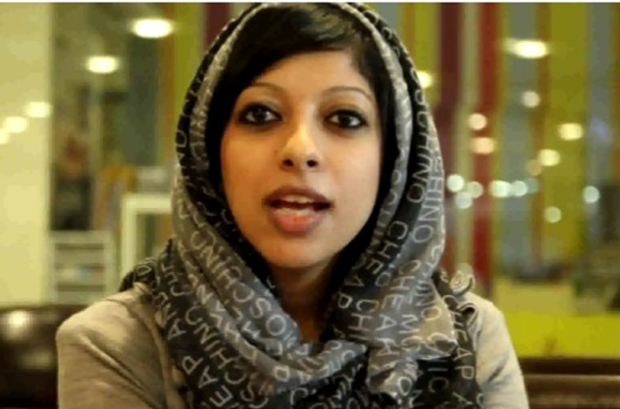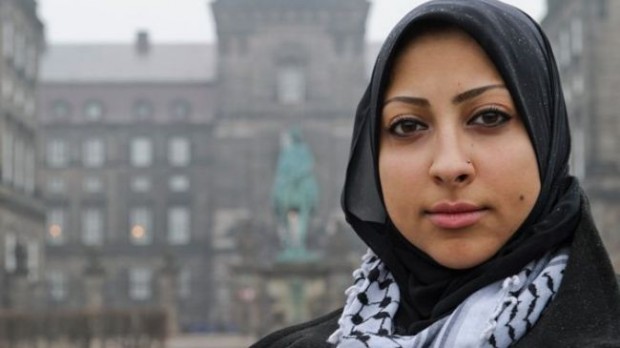Index relies entirely on the support of donors and readers to do its work.
Help us keep amplifying censored voices today.

Bahraini human rights activist Zainab Al-Khawaja was handed an additional 16 month sentence for insulting a public official, according to her sister Maryam Al-Khawaja, co-director of the Gulf Center for Human Rights.
Last week, Zainab Al-Khawaja was sentenced to three years in prison and fined 3,000 Bahraini Dinar (£5,000). She was on trial for tearing up a photo of King Hamad bin Isa Al-Khalifa at an October court date where she faced charges connected to previous rights campaigning. This comes only a week after she gave birth to her second child.
In a tweet, Maryam Al-Khawaja criticised the United Kingdom’s decision to move forward with a military base in Bahrain. “UK basically gave Bahrain regime a free pass to do pretty much anything they want,” she wrote.
The Al-Khawaja family have been heavily involved in Bahrain’s pro-democracy movement, and have been continuously targeted by authorities in the constitutional monarchy.
Al-Khawaja’s father Abdulhadi Al-Khawaja has been serving a life sentence since 2011 for the role he played in the country’s ongoing protest movement which started that year. Her sister Maryam Al-Khawaja boycotted the recent court hearing which saw her sentenced to one year in prison on what is widely acknowledged to be trumped up charges.
This article was posted on 9 December 2014 at indexoncensorship
Bahraini human rights activist Zainab Al-Khawaja has been sentenced to three years in prison for “insulting the king”.
The verdict was handed down by a Manama court on Thursday, and also included a fine of 3,000 Bahraini Dinar (£5,000). She was on trial for tearing up a photo of King Hamad bin Isa Al-Khalifa at an October court date where she faced charges connected to previous rights campaigning. This comes only days after she gave birth to her second child.
The Al-Khawaja family have been heavily involved in Bahrain’s pro-democracy movement, and have been continuously targeted by authorities in the constitutional monarchy.
Al-Khawaja’s father Abdulhadi Al-Khawaja has been serving a life sentence since 2011 for the role he played in the country’s ongoing protest movement which started that year. Her sister Maryam Al-Khawaja boycotted the recent court hearing which saw her sentenced to one year in prison on what is widely acknowledged to be trumped up charges.
This article was posted on 5 Dec 2014 at indexoncensorship.org

As a human rights defender, I, Maryam Al-Khawaja, Director of Advocacy at the Gulf Center for Human Rights, have decided to boycott my court hearing on the 1 December 2014. During this hearing I am due to be sentenced on trumped up charges of assaulting two policewomen at the Bahrain International Airport. (Update: Al-Khawaja was sentenced to one year imprisonment on 1 December)
The decision to boycott the court was reached based on several grounds:
It has become evidently clear that it is not possible to have a fair and independent trial in Bahraini courts as they stand. The judicial system in Bahrain is highly flawed, and is overrun with egregious human rights violations which usually start during the arrest, and continue throughout what is supposed to be a legal process. I was personally subjected to numerous human rights violations since the moment of arriving in Bahrain and until I was able to leave the country as can be read in my testimony here.
There are medical reports about the injuries I sustained during the assault I was subjected to, for which I continue to need physiotherapy. My case was sped up, and quickly turned for sentencing with complete disregard to legal procedures.
The presiding judge, Mohammed Ali Alkhalifa, in the case brought against me is a member of the ruling family, and has been himself, as well as members of his family, identified previously during my advocacy campaigns as implicated in human rights violations. This makes his presiding over the case a clear case of conflict of interest given the personal grievances he may have against me. This judge in particular, it is important to note, has been involved in the sentencing of numerous human rights defenders including Nabeel Rajab and Naji Fateel in unfair trials.
During my imprisonment I met with the SIU, headed by Nawaf Hamza, to submit a complaint against the three policewomen and the first lieutenant who assaulted me at the airport. The prosecutor, Mohammed Al-Hazaa, rewrote my statement in his own words, attempting to implicate me in violations, and refused to correct what he had misquoted. This resulted in my refusal to sign the papers and filing of a complaint against the prosecutor. One day before the sentencing, namely on the 30th of November 2014, and due to almost daily follow up by my lawyer, the public prosecution notified him that the complaint case had been revoked. Despite my complaint about the assault since the beginning of my arrest, it was only one day before the sentencing that my lawyer was finally able to get a statement from the public prosecution that my complaint case had been revoked, at a time when the trumped up assault charges against myself were speedily processed and turned for sentencing.
During the interrogation I was subjected to, I was refused access to my lawyer by the prosecutor dealing with my case. During my imprisonment my lawyer was not given any visits, nor was the Danish embassy. The way that the public prosecution deals with politically motivated cases is it uses all aspects of the government to provide impunity for the perpetrators of violations.
Based on the reasons stated above, I find any and all cooperation with the court or attendance of the hearings by myself as a problematic legitimisation of an unfair and biased court. Therefore I have decided to boycott the hearings, and have asked my lawyer to do the same.
It is important to note here, if I, as a human rights defender, whose case receives international media and diplomatic attention is handled in this way; it is gravely concerning how cases not receiving attention are handled by the authorities in Bahrain.
Maryam Al-Khawaja
Director of Advocacy
Gulf Center for Human Rights
30th November 2014
Update: Bahrain will hold parliamentary elections on Saturday. Opposition groups including Al-Wefaq will boycott the vote, as leading member Abdul-Jalil Khalil told the Associated Press “”These elections are destined to fail because the government is incapable of addressing the political crisis. The next parliament is going to be powerless and unrepresentative.”
In October, a Bahraini court suspended all Al-Wefaq activities for three months, including hosting rallies or press conferences. Just weeks before US State Department official Tom Malinowski was ordered to leave Bahrain after meeting with Al-Wefaq leaders.
In the last elections, held in 2010, before Arab Spring protests, the Bahraini governement claimed 67 percent voter turnout. Many doubt whether turnout will be as great to help narrow down the 419 candidates.
Bahrain human rights activist Zainab Al-Khawaja was released from prison on Wednesday after spending five weeks imprisoned. Al-Khawaja, who is more than eight months pregnant, must return to court on 4 and 9 December for her sentencing.
Al-Khawaja was arrested on 14 October after she ripped a picture of the king in court, where she faced charges for insulting the king.
“I am the daughter of a proud and free man,” Al-Khawaja said in court. “My mother brought me into this world free, and I will give birth to a free baby boy even if it is inside our prisons. It is my right, and my responsibility as a free person, to protest against oppression and oppressors.”
Maryam Al-Khawaja, Zainab’s sister, spoke with Index last month, urging the UK to speak out against human rights violations in Bahrain.
“It isn’t that the people who are being arrested will stop doing what they do, because I don’t think that they will and I think the past four years have been evidence to that,” Maryam said. “My worry is that those people become voiceless. Those people become people who are not heard or seen or cared about. Because that’s when the Bahraini government will find the platform to do whatever they want to do to those people. ”
Maryam also spent time in prison recently and will return to court on 1 December. Their father remains imprisoned.
Nabeel Rajab, President of the Bahrain Center for Human Rights and director of the Gulf Center for Human Rights (GCHR), was recently released on bail after his 1 October arrest. Rajab was imprisoned for “denigrating government institutions” on Twitter.
The GCHR released a statement calling for Rajab’s charges to be dropped.
“Bahrain has made international commitments to protect freedom of expression, yet it continues to jail human rights defenders who are simply exercising their right to free speech, whether via twitter or while speaking internationally about Bahrain’s problems,” said Khalid Ibraham, co-director of GCHR.
Rajab must return to court on 20 January 2015 and may not leave Bahrain until then.
Rajab was released in May after spending two years in prison for “making offensive tweets and taking part in illegal protests.”